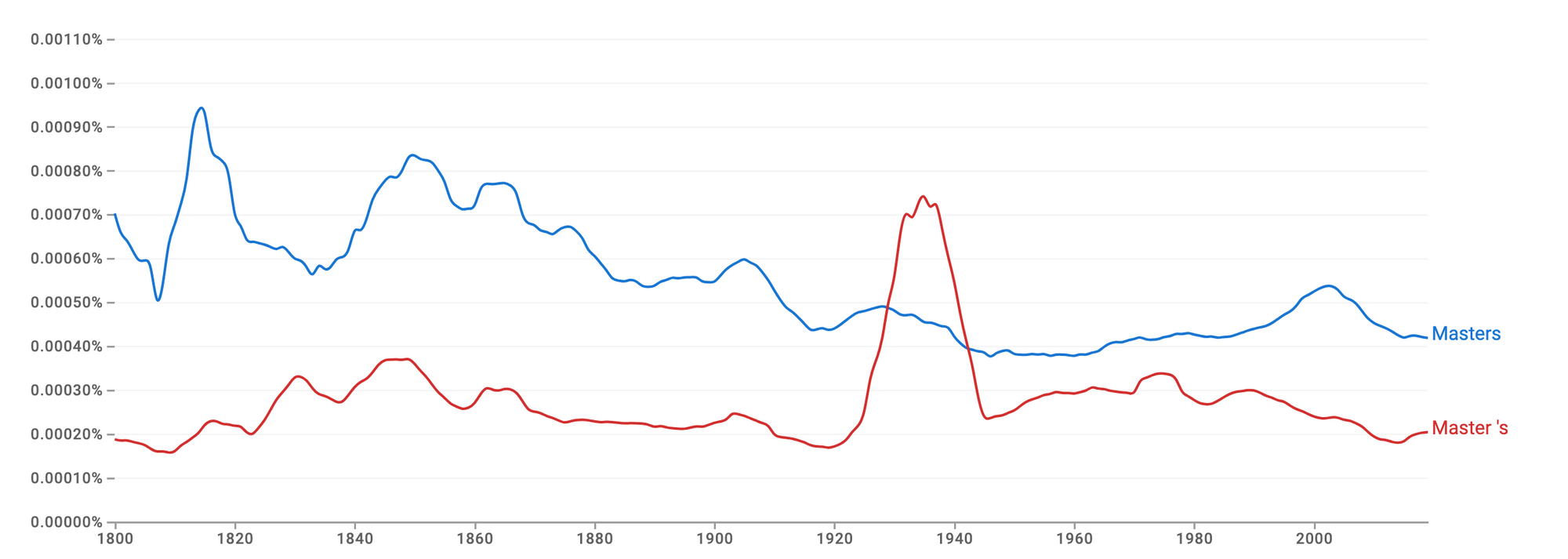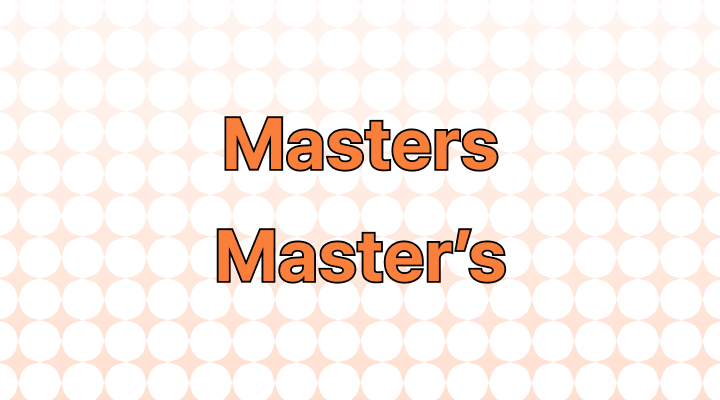"Masters" should not be used interchangeably with "master's". "Master's" with an apostrophe is primarily used to denote possession or association with a master's degree.
In the below graph, you can see that the word "masters" is used in higher frequency than "master's"; however, it is important to note that these two words do not have the same meaning. Thus, we need to be more thoughtful about the type of context we use both words. This blogpost provides information on how to correctly use these words.

Can we use the word masters to describe the advanced degree?
No, master's, with an apostrophe, is the correct term to refer to the higher degree.
What does master's with an apostrophe mean?
"Master's" with an apostrophe is primarily used to denote possession or association with a master's degree. When someone has completed a program of advanced study at a university or college, they earn a master's degree. This degree signifies a high level of expertise and specialized knowledge in a particular field.
For instance, someone might earn a "Master's degree in Economics" or a "Master's in Fine Arts." In these cases, "master's" is possessive, indicating that the degree belongs to the individual who earned it. Additionally, it can be used to describe items or concepts associated with this level of education, such as a "master's thesis" or "master's program."
Example sentences
- She proudly displayed her Master's degree in Education on her office wall.
- After completing his Master's in Computer Science, he was offered a job at a prestigious tech company.
- The Master's program in Environmental Science offers a diverse range of courses.
- Writing a master's thesis can be a challenging but rewarding experience.
- He pursued his Master's in Business Administration to enhance his career prospects.
- The university offers scholarships to exceptional students pursuing a master's degree.
- She is planning to attend the master's graduation ceremony next month.
- His master's thesis on renewable energy sources received recognition at a national conference.
- Completing a master's degree often requires a combination of coursework and research.
- Many professionals choose to earn a master's degree to specialize in their field and advance their careers.
How to properly capitalize the word "master's"?
To properly capitalize "Master's," ensure that it is capitalized when used as a formal academic or professional title or when referring to the degree itself.
For example, you would write, "She earned her Master's in Economics from Harvard University." The capitalization is important to show that it is a specific degree. However, when using "master's" in a more general sense, such as describing a program or field of study, it should be in lowercase. For instance, "The university offers a master's degree program in environmental science." Consistent and correct capitalization is essential for clarity and professionalism in academic and professional writing.
Common idioms/phrases
"Master's" is not typically used in common idioms or phrases. However, it is commonly used in academic and professional contexts to refer to a master's degree or related concepts. Here are some phrases and idiomatic expressions that use "master's" in these contexts:
- Earn/get one's master's: Refers to completing the requirements for a master's degree.
- She worked diligently to earn her master's in psychology.
- Master's program: A structured course of study leading to a master's degree.
- He's enrolled in a master's program in finance at the university.
- Master's thesis: A research project or paper required to earn a master's degree.
- Writing a master's thesis can be a challenging but rewarding endeavor.
- Master's level: Indicates something is at an advanced level, often associated with graduate education.
- This course is designed for students at the master's level and covers advanced topics in chemistry.
Understanding the distinction between "master's" and "masters" is essential to avoid ambiguity and accurately convey information. Whether discussing the accomplishments of individuals or the concept of a master's degree, the correct usage ensures effective communication and clarity in both spoken and written language.
Discover more about the AI English proofreader, Engram!

Reference














